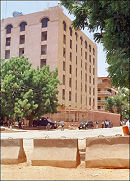 Today the Office of Foreign Assets Control (“OFAC”) added three Burmese entities to the Specially Designated Nationals and Blocked Persons List, i.e., the SDN List. Among the three entities was the Myanmar Gem Enterprise, the state-owned monopoly that is in charge of gem sales in Burma. As you may know, Burmese rubies are especially prized and the sale of these rubies is thought to constitute a significant part of the revenues to the military junta that controls Burma.
Today the Office of Foreign Assets Control (“OFAC”) added three Burmese entities to the Specially Designated Nationals and Blocked Persons List, i.e., the SDN List. Among the three entities was the Myanmar Gem Enterprise, the state-owned monopoly that is in charge of gem sales in Burma. As you may know, Burmese rubies are especially prized and the sale of these rubies is thought to constitute a significant part of the revenues to the military junta that controls Burma.
Current OFAC regulations forbid the import into the United States of Burmese-origin goods. OFAC, however, refers to U.S. Customs rules for determining whether a good is of Burmese-origin, as can be seen from this OFAC guidance letter on Burmese teak sawn into planks in third countries. Most Burmese rubies are exported in uncut form to Thailand where they are processed and cut for sale to jewelers. In December 2004, Customs ruled that rough rubies mined in Burma that were processed and cut into gemstone rubies in another country underwent a “substantial transformation” and were no longer considered to be of Burmese origin. Notwithstanding this ruling, the 11,000 member association Jewelers of America urges its members not to traffic in blood rubies.
It is not clear that the designation of the Myanmar Gem Enterprise will have any substantial effect. Because the Burmese rubies must be processed in Thailand or elsewhere in order to be imported into the United States, no U.S. persons have any dealings with Myanmar Gem Enterprise but, rather, deal exclusively with companies in Thailand that process and cut the rough stones.
OFAC also designated the Myanmar Pearl Enterprise, hence the opportunity to swipe a line from an A.E. Housman poem as the title of this post.

 Posted by
Posted by  Category:
Category: 

 The Wall Street Journal’s Law Blog had an
The Wall Street Journal’s Law Blog had an  Last week the Department of Treasury’s Office of Foreign Assets Control issued a
Last week the Department of Treasury’s Office of Foreign Assets Control issued a 



